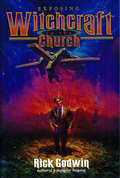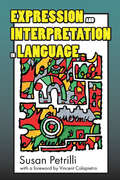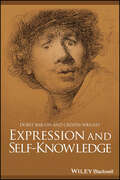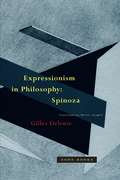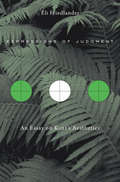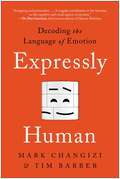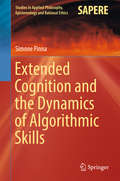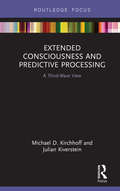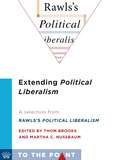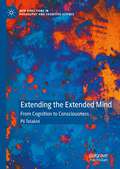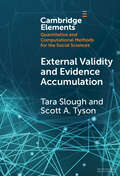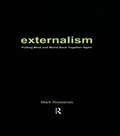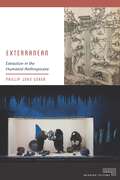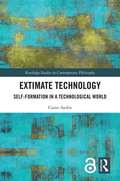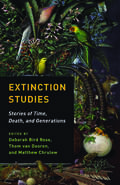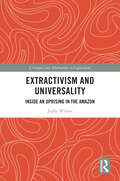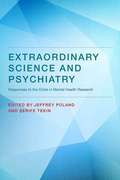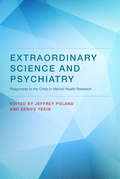- Table View
- List View
Exposing Witchcraft In the Church
by Rick GodwinThe Bible says that rebellion is as the sin of witchcraft, and Rick Godwin believes that rebellion is rampant in the churches today. Satan is using some unfamilar spirits to divide and destroy families and churches. Godwin's teaching exposes how the devil is using the sin of witchcraft, and how you can defeat the enemy and his evil plots. Ideal reading for pastors, church leaders and anyone else interested in knowing what the Bible says about the satanic scheme to bring down your church.
Exposure: Poisoned Water, Corporate Greed, And One Lawyer's Twenty-year Battle Against Dupont
by Robert BilottERIN BROCKOVICH meets SILENT SPRING in this astounding true story of a lawyer who spent two decades building a case against one of the world’s largest chemical companies, uncovering a shocking history of environmental pollution and heartless cover-up. The story that inspired the forthcoming motion picture from Participant Media/Focus Features, starring Mark Ruffalo, Anne Hathaway, Bill Pullman and Tim Robbins, directed by Todd Haynes. In 1998, Robert Bilott was a 33-year-old Cincinnati lawyer on the verge of making partner when his career and life took an unforeseen turn. He was taken by surprise when he received a call from a man named Earl Tennant, a farmer from West Virginia with a slight connection to Robert’s family. Earl was convinced the creek on his property, where his cattle grazed, was being poisoned by run-off from a neighbouring factory landfill. His cattle were dying in hideous ways, and he hadn’t even been able to get a water sample tested by local agencies, politicians or vets. As soon as they heard the name DuPont – the area’s largest employer – he felt they were reluctant to investigate further. Once Robert saw the thick, foamy water that bubbled into the creek, the gruesome effects it seemed to have on livestock, and the disturbing frequency of cancer and lung problems in the surrounding area, he was persuaded to fight against the type of corporation his firm routinely represented. With all the cards stacked against him, Rob happened upon a stray reference in a random memo to a chemical called PFOA – a substance he’d never heard of that is used in the manufacture of Teflon. From that one reference, he ultimately gained access to 110,000 pages of DuPont documents, some of them fifty years old, that reveal decades of medical studiesproving the harmful – more often than not fatal – effects of PFOA in animals and humans. And yet PFOA sludge had still been dumped into rivers and landfill, endangering many lives. The case of one farmer soon spawns a class-action suit and the shocking realisation that virtually every person on the planet has been exposed to PFOA and carries the chemical in his or her blood.This is the unforgettable story of the lawyer who worked tirelessly for twenty years to get justice for all those who had suffered because of this chemical.
Expression and Interpretation in Language
by Susan PetrilliThis book features the full scope of Susan Petrilli's important work on signs, language, communication, and of meaning, interpretation, and understanding. Although readers are likely familiar with otherness, interpretation, identity, embodiment, ecological crisis, and ethical responsibility for the biosphere-Petrilli forges new paths where other theorists have not tread. This work of remarkable depth takes up intensely debated topics, exhibiting in their treatment of them what Petrilli admires-creativity and imagination. Petrilli presents a careful integration of divergent thinkers and diverse perspectives. While she abandons hope of attaining a final synthesis or an unqualifiedly comprehensive outlook, there remains a drive for coherence and detailed integration. The theory of identity being advocated in this book will provide the reader with an aid to appreciating the identity of the theorizing undertaken by Petrilli in her confrontation with an array of topics. Her theory differentiates itself from other offerings and, at the same time, is envisioned as a process of self-differentiation. Petrilli's contribution is at once historical and theoretical. It is historical in its recovery of major figures of language; it is theoretical in its articulation of a comprehensive framework. She expertly combines analytic precision and moral passion, theoretical imagination and political commitment.
Expression and Self-Knowledge (Great Debates in Philosophy)
by Crispin Wright Dorit Bar-OnProvides a timely and original contribution to the debate surrounding privileged self-knowledge Contemporary epistemologists and philosophers of mind continue to find puzzling the nature and source of privileged self-knowledge: the ordinary and effortless ‘first-person’ knowledge we have of our own sensations, moods, emotions, beliefs, desires, and hopes. In Expression and Self-Knowledge, Dorit Bar-On and Crispin Wright articulate their joint dissatisfaction with extant accounts of self-knowledge and engage in a sustained and substantial critical debate over the merits of an expressivist approach to the topic. The authors incorporate cutting-edge research while defending their own alternatives to existing approaches to so-called ‘first-person privilege’. Bar-On defends her neo-expressivist account, addressing the objection that neo-expressivism fails to provide an adequate epistemology of ordinary self-knowledge, and addresses new objections levelled by Wright. Wright then presents an alternative pluralist approach, and Bar-On argues in response that pluralism faces difficulties neo-expressivism avoids. Providing invaluable insights on a hotly debated topic in epistemology and philosophy of mind, Expression and Self-Knowledge: Presents an in-depth debate between two leading philosophers over the expressivist approach Offers novel developments and penetrating criticisms of the authors' respective views Features two different perspectives on the influential remarks on expression and self-knowledge found in Wittgenstein’s later writings Includes four jointly written chapters that offer a critical overview of prominent existing accounts, which provide a useful advanced introduction to the subject.Expression and Self-Knowledge is essential reading for epistemologists, philosophers of mind and language, psychologists with an interest in self-knowledge, and researchers and graduate students working in expression, expressivism, and self-knowledge.
Expressionism in Philosophy: Spinoza
by Gilles DeleuzeIn this remarkable work, Gilles Deleuze, the renowned French philosopher, reflects on one of the thinkers of the past who most influenced his own sweeping reconfiguration of the tasks of philosophy. For Deleuze, Spinoza, along with Nietzsche and Lucretius, conceived of philosophy as an enterprise of liberation and radical demystification. He locates in Spinoza “a set of affects, a kinetic determination, an impulse” and makes Spinoza into “an encounter, a passion.”Expressionism in Philosophy was the culmination of a series of monographic studies by Deleuze (on Hume, Bergson, Nietzsche, Proust, Kant, and Sacher-Masoch) and prepared the transition from these abstract treatments of historical schemes of experience to the nomadology of Capitalism and Schizophrenia (Anti-Oedipus and A Thousand Plateaus, co-authored with Félix Guattari). Thus, Expressionism in Philosophy is both a pivotal reading of Spinoza’s work and a crucial text within the development of Deleuze’s thought.
Expressions of Judgment: An Essay on Kant's Aesthetics
by Eli FriedlanderKant's The Critique of Judgment laid the groundwork of modern aesthetics when it appeared in 1790. Eli Friedlander's reappraisal emphasizes the internal connection of judgment and meaning, showing how the pleasure in judging is intimately related to our capacity to draw meaning from our encounter with beauty.
Expressions of Judgment: An Essay on Kant's Aesthetics
by Eli FriedlanderThe Critique of Judgment-the third and final work in Kant's critical system-laid the groundwork of modern aesthetics when it appeared in 1790. Eli Friedlander's reappraisal of this seminal accomplishment reformulates and elucidates Kant's thought in order to reveal the inner unity of the Third Critique. Expressions of Judgment emphasizes the internal connection of judgment and meaning in Kant's aesthetics, showing how the pleasure in judging is intimately related to our capacity to draw meaning from our encounter with beauty. Although the meaningfulness of aesthetic judgment is most evident in the response to art, the appreciation of nature's beauty has an equal share in the significant experience of our world. Friedlander's attention to fundamental dualities underlying the Third Critique-such as that of art and nature-underscores how its themes are subordinated systematically to the central task Kant sets himself: that of devising a philosophical blueprint for the mediation between the realms of nature and freedom. This understanding of the mediating function of judgment guides Friedlander in articulating the dimensions of the field of the aesthetic that opens between art and nature, the subject and the object, knowledge and the will, as well as between the individual and the communal. Expressions of Judgment illuminates the distinctness as well as the continuity of this important late phase in Kant's critical enterprise, providing insights for experienced scholars as well as new students of philosophy.
Expressivism, Pragmatism And Representationalism
by Michael Williams Simon Blackburn Huw Price Robert BrandomPragmatists have traditionally been enemies of representationalism but friends of naturalism, when naturalism is understood to pertain to human subjects, in the sense of Hume and Nietzsche. In this volume Huw Price presents his distinctive version of this traditional combination, as delivered in his Ren Descartes Lectures at Tilburg University in 2008. Price contrasts his view with other contemporary forms of philosophical naturalism, comparing it with other pragmatist and neo-pragmatist views such as those of Robert Brandom and Simon Blackburn. Linking their different 'expressivist' programmes, Price argues for a radical global expressivism that combines key elements from both. With Paul Horwich and Michael Williams, Brandom and Blackburn respond to Price in new essays. Price replies in the closing essay, emphasising links between his views and those of Wilfrid Sellars. The volume will be of great interest to advanced students of philosophy of language and metaphysics.
Expressly Human: Decoding the Language of Emotion
by Mark Changizi Tim BarberGood communication, conventional wisdom suggests, is calm, logical, rational. Emotions, we&’re told, just get in the way. But what if this is backwards? What if those emotional overtones are the main messages we&’re sending to one another, and all that logical language is just window dressing? Over billions of years of evolution, animals have become increasingly sophisticated and increasingly sentient. In the process, they evolved emotions, which helped improve their odds of survival in complex situations. These emotions were, at first, purely internal. But at some point, social animals began expressing their emotions, in increasingly dramatic ways. These emotional expressions could accurately reflect internal emotions (smiling to express happiness)—or they could be quite different (smiling to cover up that you&’re actually furious, but can&’t tell your boss that). Why did once-stone-faced animals evolve to be so emotionally expressive—to be us? The answer, as evolutionary neurobiologist Mark Changizi and mathematician Tim Barber reveal, is that emotional expressions are our first and most important language—one that allows us, as social animals, to engage in highly sophisticated communications and negotiations. Expressly Human introduces an original theory that explains, from first principles, how the broad range of emotional expressions evolved, and provides a Rosetta Stone for human communication. It will revolutionize the way you see every social interaction, from deciding who gets the last slice of pizza to multimillion-dollar business negotiations, and change your definition of what makes us human.
Extended Cognition and the Dynamics of Algorithmic Skills
by Simone PinnaThis book describes a novel methodology for studying algorithmic skills, intended as cognitive activities related to rule-based symbolic transformation, and argues that some human computational abilities may be interpreted and analyzed as genuine examples of extended cognition. It shows that the performance of these abilities relies not only on innate neurocognitive systems or language-related skills, but also on external tools and general agent-environment interactions. Further, it asserts that a low-level analysis, based on a set of core neurocognitive systems linking numbers and language, is not sufficient to explain some specific forms of high-level numerical skills, like those involved in algorithm execution. To this end, it reports on the design of a cognitive architecture for modeling all the relevant features involved in the execution of algorithmic strategies, including external tools, such as paper and pencils. The first part of the book discusses the philosophical premises for endorsing and justifying a position in philosophy of mind that links a modified form of computationalism with some recent theoretical and scientific developments, like those introduced by the so-called dynamical approach to cognition. The second part is dedicated to the description of a Turing-machine-inspired cognitive architecture, expressly designed to formalize all kinds of algorithmic strategies.
Extended Consciousness and Predictive Processing: A Third Wave View (Routledge Focus on Philosophy)
by Julian Kiverstein Michael D. KirchhoffIn this jointly authored book, Kirchhoff and Kiverstein defend the controversial thesis that phenomenal consciousness is realised by more than just the brain. They argue that the mechanisms and processes that realise phenomenal consciousness can at times extend across brain, body, and the social, material, and cultural world. Kirchhoff and Kiverstein offer a state-of-the-art tour of current arguments for and against extended consciousness. They aim to persuade you that it is possible to develop and defend the thesis of extended consciousness through the increasingly influential predictive processing theory developed in cognitive neuroscience. They show how predictive processing can be given a new reading as part of a third-wave account of the extended mind. The third-wave claims that the boundaries of mind are not fixed and stable but fragile and hard-won, and always open to negotiation. It calls into question any separation of the biological from the social and cultural when thinking about the boundaries of the mind. Kirchhoff and Kiverstein show how this account of the mind finds support in predictive processing, leading them to a view of phenomenal consciousness as partially realised by patterns of cultural practice.
Extended Rationality
by Annalisa ColivaExtended Rationality: A Hinge Epistemology provides a novel account of the structure of epistemic justification. Its central claim builds upon Wittgenstein's idea in On Certainty that epistemic justifications hinge on some basic assumptions and that epistemic rationality extends to these very hinges. It exploits these ideas to address major problems in epistemology, such as the nature of perceptual justifications, external world skepticism, epistemic relativism, the epistemic status of basic logical laws, of the Principle of the Uniformity of Nature, of our belief in the existence of the past and of other minds, and the nature of testimonial justification. Along the way, further technical issues, such as the scope of the Principle of Closure of epistemic operators under known entailment, the notion of transmission failure, and the existence of entitlements are addressed in new and illuminating ways.
Extending Political Liberalism: A Selection from Rawls's Political Liberalism
by Martha C. Nussbaum Thom BrooksWidely hailed as one of the most significant works in modern political philosophy, John Rawls’s Political Liberalism (1993) defended a powerful vision of society that respects reasonable ways of life, both religious and secular. These core values have never been more critical as anxiety grows over political and religious difference and new restrictions are placed on peaceful protest and individual expression. In her introduction to the volume, Martha Nussbaum discusses the main themes of Political Liberalism and puts them into the context of contemporary philosophical debates.
Extending Political Liberalism: A Selection from Rawls's Political Liberalism, edited by Thom Brooks and Martha C. Nussbaum (To the Point)
by Martha C. NussbaumWidely hailed as one of the most significant works in modern political philosophy, John Rawls's Political Liberalism (1993) defended a powerful vision of society that respects reasonable ways of life, both religious and secular. These core values have never been more critical as anxiety grows over political and religious difference and new restrictions are placed on peaceful protest and individual expression. In her introduction to the volume, Martha Nussbaum discusses the main themes of Political Liberalism and puts them into the context of contemporary philosophical debates.
Extending the Extended Mind: From Cognition to Consciousness (New Directions in Philosophy and Cognitive Science)
by Pii TelakiviThis book argues that conscious experience is sometimes extended outside the brain and body into certain kinds of environmental interaction and tool use. It shows that if one accepts that cognitive states can extend, one must also accept that consciousness can extend. The proponents of Extended Mind defend the former claim, but usually oppose the latter claim. The most important undertaking of this book is to show that this partition is not possible on pain of inconsistency. Pii Telakivi presents three arguments for the hypothesis of Extended Conscious Mind, examines and answers the most common counterarguments, and introduces a novel means to interpret and apply the concept of constitution. She also addresses the tensions between analytic philosophy of mind and enactivism, and builds a bridge between two different traditions: on the one hand, extended mind, and on the other, enactivism and embodied mind—and maintains that a unifying approach is necessary for a theory about extended consciousness.
External Intervention and the Politics of State Formation
by Ja Ian ChongThis book explores ways foreign intervention and external rivalries can affect the institutionalization of governance in weak states. When sufficiently competitive, foreign rivalries in a weak state can actually foster the political centralization, territoriality and autonomy associated with state sovereignty. This counterintuitive finding comes from studying the collective effects of foreign contestation over a weak state as informed by changes in the expected opportunity cost of intervention for outside actors. When interveners associate high opportunity costs with intervention, they bolster sovereign statehood as a next best alternative to their worst fear – domination of that polity by adversaries. Sovereign statehood develops if foreign actors concurrently and consistently behave this way toward a weak state. This book evaluates that argument against three 'least likely' cases – China, Indonesia and Thailand between the late nineteenth and mid-twentieth centuries.
External Validity and Evidence Accumulation (Elements in Quantitative and Computational Methods for the Social Sciences)
by Tara Slough Scott A. TysonThe accumulation of empirical evidence that has been collected in multiple contexts, places, and times requires a more comprehensive understanding of empirical research than is typically required for interpreting the findings from individual studies. We advance a novel conceptual framework where causal mechanisms are central to characterizing social phenomena that transcend context, place, or time. We distinguish various concepts of external validity, all of which characterize the relationship between the effects produced by mechanisms in different settings. Approaches to evidence accumulation require careful consideration of cross-study features, including theoretical considerations that link constituent studies and measurement considerations about how phenomena are quantifed. Our main theoretical contribution is developing uniting principles that constitute the qualitative and quantitative assumptions that form the basis for a quantitative relationship between constituent studies. We then apply our framework to three approaches to studying general social phenomena: meta-analysis, replication, and extrapolation.
Externalism, Self-Knowledge, and Skepticism
by Sanford C. GoldbergWritten by an international team of leading scholars, this collection of thirteen new essays explores the implications of semantic externalism for self-knowledge and skepticism, bringing recent developments in the philosophy of mind, the philosophy of language, and epistemology to bear on the issue. Structured in three parts, the collection looks at self-knowledge, content transparency, and then meta-semantics and the nature of mental content. The chapters examine a wide range of topics in the philosophy of mind and the philosophy of language, including 2D semantics, transparency views of self-knowledge, and theories of linguistic understanding, as well as epistemological debates on contextualism, contrastivism, pragmatic encroachment, anti-luminosity arguments and testimony. The scope of the volume will appeal to graduate students and researchers in epistemology, philosophy of mind, philosophy of language, cognitive science, psychology and linguistics.
Externalism: Putting Mind And World Back Together Again
by Mark RowlandsIt is commonly held that our thoughts, beliefs, desires and feelings - the mental phenomena that we instantiate - are constituted by states and processes that occur inside our head. The view known as externalism, however, denies that mental phenomena are internal in this sense. The mind is not purely in the head. Mental phenomena are hybrid entities that straddle both internal state and processes and things occurring in the outside world. The development of externalist conceptions of the mind is one of the most controversial, and arguably one of the most important, developments in the philosophy of mind in the second half of the twentieth century. Yet, despite its significance most recent work on externalism has been highly technical, clouding its basic ideas and principles. Moreover, very little work has been done to locate externalism within philosophical developments in both analytic and continental traditions. In this book, Mark Rowlands aims to remedy both these problems and present for the reader a clear and accessible introduction to the subject grounded in wider developments in the history of philosophy. Rowlands shows that externalism has significant and respectable historical roots that make it much more important than a specific eruption that occurred in late twentieth-century analytic philosophy.
Exterranean: Extraction in the Humanist Anthropocene (Meaning Systems)
by Phillip John UsherExterranean concerns the extraction of stuff from the Earth, a process in which matter goes from being sub- to exterranean. By opening up a rich archive of nonmodern texts and images from across Europe, this work offers a bracing riposte to several critical trends in ecological thought. By shifting emphasis from emission to extraction, Usher reorients our perspective away from Earthrise-like globes and shows what is gained by opening the planet to depths within. The book thus maps the material and immaterial connections between the Earth from which we extract, the human and nonhuman agents of extraction, and the extracted matter with which we live daily.Eschewing the self-congratulatory claims of posthumanism, Usher instead elaborates a productive tension between the materially-situated homo of nonmodern humanism and the abstract and aggregated anthropos of the Anthropocene. In dialogue with Michel Serres, Bruno Latour, and other interdisciplinary work in the environmental humanities, Usher shows what premodern material can offer to contemporary theory. Examining textual and visual culture alike, Usher explores works by Ronsard, Montaigne, and Rabelais, early scientific works by Paracelsus and others, as well as objects, engravings, buildings, and the Salt Mines of Wieliczka. Both historicist and speculative in approach, Exterranean lays the groundwork for a comparative ecocriticism that reaches across and untranslates theoretical affordances between periods and languages.
Extimate Technology: Self-Formation in a Technological World (Routledge Studies in Contemporary Philosophy)
by Ciano AydinThis book investigates how we should form ourselves in a world saturated with technologies that are profoundly intruding in the very fabric of our selfhood. New and emerging technologies, such as smart technological environments, imaging technologies and smart drugs, are increasingly shaping who and what we are and influencing who we ought to be. How should we adequately understand, evaluate and appreciate this development? Tackling this question requires going beyond the persistent and stubborn inside-outside dualism and recognizing that what we consider our "inside" self is to a great extent shaped by our "outside" world. Inspired by various philosophers – especially Nietzsche, Peirce and Lacan –this book shows how the values, goals and ideals that humans encounter in their environments not only shape their identities but also enable them to critically relate to their present state. The author argues against understanding technological self-formation in terms of making ourselves better, stronger and smarter. Rather, we should conceive it in terms of technological sublimation, which redefines the very notion of human enhancement. In this respect the author introduces an alternative, more suitable theory, namely Technological Sublimation Theory (TST). Extimate Technology will be of interest to scholars and advanced students working in philosophy of technology, philosophy of the self, phenomenology, pragmatism, and history of philosophy.
Extinction Studies: Stories of Time, Death, and Generations
by Thom Van Dooren Edited by Deborah Bird Rose Matthew ChrulewExtinction Studies focuses on the entangled ecological and social dimensions of extinction, exploring the ways in which extinction catastrophically interrupts life-giving processes of time, death, and generations. The volume opens up important philosophical questions about our place in, and obligations to, a more-than-human world. Drawing on fieldwork, philosophy, literature, history, and a range of other perspectives, each of the chapters in this book tells a unique extinction story that explores what extinction is, what it means, why it matters—and to whom.
Extractivism and Universality: Inside an Uprising in the Amazon (Critiques and Alternatives to Capitalism)
by Japhy WilsonExtractivism and Universality tells the inside story of a spontaneous uprising in the Ecuadorian Amazon in 2017, in which mestizo, Black and Indigenous workers and communities confronted the combined forces of a multinational oil company and a militarized state. It documents a rapidly evolving battle that achieved a remarkable victory, and captures the flourishing of an insurgent form of political universality in which racial, ethnic, and cultural divisions were suddenly and powerfully overcome. Intervening in debates on the resistances and alternatives developed by the inhabitants of resource extraction zones, the book takes the reader deep inside a rebellion on an Amazonian oil frontier and offers a unique insight into insurgent universality in the lived reality of its material existence. It argues that the dominant decolonial dichotomy between Eurocentric universalism and an Indigenous pluriverse should be replaced by an approach that is attentive to manifestations of universality performed by diverse subaltern subjects. And it does so through a fast-paced fusion of radical political theory with the raw first-person style of gonzo journalism. It will appeal to scholars and students across the social sciences with interests in political and social theory, social movements, labour relations, and the political ecology of extractivism.
Extraordinary Science and Psychiatry: Responses to the Crisis in Mental Health Research
by Jeffrey Poland Serife TekinPsychiatry and mental health research is in crisis, with tensions between psychiatry's clinical and research aims and controversies over diagnosis, treatment, and scientific constructs for studying mental disorders. At the center of these controversies is the Diagnostic and Statistical Manual of Mental Disorders (DSM), which -- especially after the publication of DSM-5 -- many have found seriously flawed as a guide for research. This book addresses the crisis and the associated "extraordinary science" (Thomas Kuhn's term for scientific research during a state of crisis) from the perspective of philosophy of science. The goal is to help reconcile the competing claims of science and phenomenology within psychiatry and to offer new insights for the philosophy of science. The contributors discuss the epistemological origins of the current crisis, the nature of evidence in psychiatric research, and the National Institute for Mental Health's Research Domain Criteria project. They consider particular research practices in psychiatry -- computational, personalized, mechanistic, and user-led -- and the specific categories of schizophrenia, depressive disorder, and bipolar disorder. Finally, they examine the DSM's dubious practice of pathologizing normality.ContributorsRichard P. Bentall, John Bickle, Robyn Bluhm, Rachel Cooper, Kelso Cratsley, Owen Flanagan, Michael Frank, George Graham, Ginger A. Hoffman, Harold Kincaid, Aaron Kostko, Edouard Machery, Jeffrey Poland, Claire Pouncey, Serife Tekin, Peter Zachar
Extraordinary Science and Psychiatry: Responses to the Crisis in Mental Health Research (Philosophical Psychopathology)
by Jeffrey Poland Şerife TekinLeading scholars offer perspectives from the philosophy of science on the crisis in psychiatric research that exploded after the publication of DSM-5.Psychiatry and mental health research is in crisis, with tensions between psychiatry's clinical and research aims and controversies over diagnosis, treatment, and scientific constructs for studying mental disorders. At the center of these controversies is the Diagnostic and Statistical Manual of Mental Disorders (DSM), which—especially after the publication of DSM-5—many have found seriously flawed as a guide for research. This book addresses the crisis and the associated “extraordinary science” (Thomas Kuhn's term for scientific research during a state of crisis) from the perspective of philosophy of science. The goal is to help reconcile the competing claims of science and phenomenology within psychiatry and to offer new insights for the philosophy of science. The contributors discuss the epistemological origins of the current crisis, the nature of evidence in psychiatric research, and the National Institute for Mental Health's Research Domain Criteria project. They consider particular research practices in psychiatry—computational, personalized, mechanistic, and user-led—and the specific categories of schizophrenia, depressive disorder, and bipolar disorder. Finally, they examine the DSM's dubious practice of pathologizing normality.ContributorsRichard P. Bentall, John Bickle, Robyn Bluhm, Rachel Cooper, Kelso Cratsley, Owen Flanagan, Michael Frank, George Graham, Ginger A. Hoffman, Harold Kincaid, Aaron Kostko, Edouard Machery, Jeffrey Poland, Claire Pouncey, Şerife Tekin, Peter Zachar
